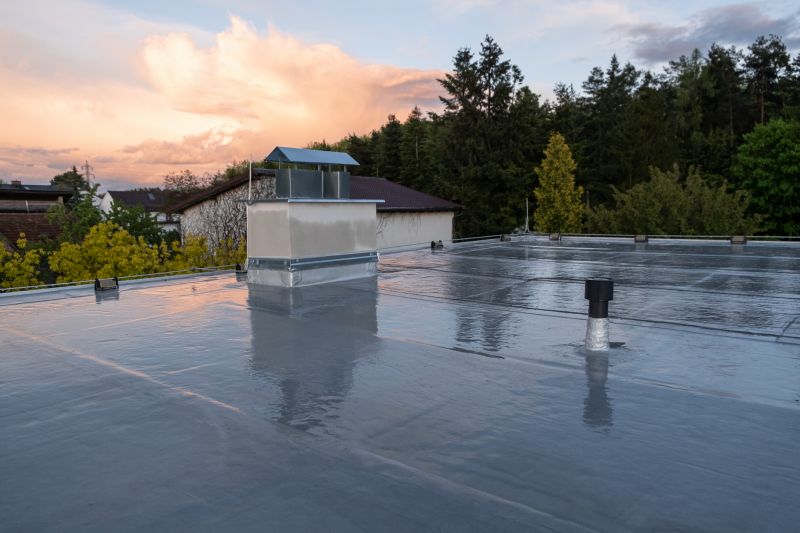Expert Picks for Roofing Service Tools That Boost Job Site Productivity
Learn about the most effective equipment that can enhance workflow, safety, and quality on roofing projects.
 In Sussex County, NJ, maintaining and repairing roofs requires a range of specialized products designed to ensure durability, safety, and efficiency. From the initial assessment to final installation, choosing the right tools and materials can significantly impact the quality and longevity of roofing projects. The selection process involves understanding the specific needs of each roofing system, whether it is residential, commercial, or industrial. High-quality products help facilitate proper installation, prevent leaks, and withstand the elements over time. It is essential for homeowners and contractors alike to be familiar with the various options available to make informed decisions tailored to their particular roofing requirements.
In Sussex County, NJ, maintaining and repairing roofs requires a range of specialized products designed to ensure durability, safety, and efficiency. From the initial assessment to final installation, choosing the right tools and materials can significantly impact the quality and longevity of roofing projects. The selection process involves understanding the specific needs of each roofing system, whether it is residential, commercial, or industrial. High-quality products help facilitate proper installation, prevent leaks, and withstand the elements over time. It is essential for homeowners and contractors alike to be familiar with the various options available to make informed decisions tailored to their particular roofing requirements.
Top Overall Option
Comprehensive Roofing System Components
A complete roofing system includes a combination of high-quality underlayments, membranes, flashing, fasteners, and sealants. Selecting a well-rounded set of components ensures compatibility and durability across different roofing applications. These products work together to provide effective protection against water intrusion, wind uplift, and other environmental factors. When choosing roofing system components, it is important to consider their specifications, installation requirements, and suitability for local conditions. Properly integrated, these products contribute to a resilient and long-lasting roof that meets both safety standards and functional needs.
Types of Products For Roofing Service
Roofing Underlayments
Protective layers installed beneath the main roofing material to provide additional water resistance and insulation.
Roofing Membranes
Flexible sheets used for waterproofing flat or low-slope roofs, available in various materials such as rubber or thermoplastics.
Roofing Nails and Fasteners
Specialized fasteners designed to secure roofing materials firmly to the underlying structure.
Roofing Sealants and Caulks
Materials used to seal joints, flashing, and penetrations to prevent leaks and water intrusion.
Flashing Materials
Metal or flexible strips installed at roof intersections, chimneys, and vents to direct water away from critical areas.
Roof Ventilation Products
Vents and exhaust systems that promote airflow and reduce moisture buildup within the attic space.
Roofing Tools
Specialized tools such as roofing nailers, shingle cutters, and safety harnesses to facilitate installation and safety.
Skylights and Roof Windows
Light-transmitting fixtures designed to be integrated into roofing systems for natural illumination.
Roof Coatings
Protective coatings applied over roofing surfaces to extend lifespan and improve reflectivity.
Insulation Materials
Insulation products used beneath roofing decks to improve energy efficiency and thermal performance.
Gutters and Downspouts
Systems designed to channel rainwater away from the roof and foundation, preventing water damage.
Roof Anchors and Safety Equipment
Safety gear essential for working at heights, including harnesses, anchors, and fall protection systems.
Roofing Accessories
Additional items such as ridge caps, vents, and decorative elements that complete the roofing aesthetic.
Popular Choices
Widely used for added protection beneath shingles or other roofing materials.
Commonly selected for flat roof waterproofing applications.
Essential for securing roofing materials reliably.
Popular for sealing around vents, chimneys, and flashing.
Frequently used to prevent water intrusion at roof intersections.
Trending for improving attic airflow and reducing moisture.
Chosen for extending the life of existing roofs.
Commonly installed to manage rainwater runoff effectively.
Vital for ensuring safety during roofing work at heights.
Popular among contractors for efficiency and safety.
Roofing projects often demand a combination of products, including protective coverings, sealing materials, and specialized tools. Properly selecting these items can streamline the process, reduce errors, and enhance safety. For example, durable roofing membranes and underlayments provide foundational protection, while tools such as roofing nailers and safety harnesses ensure efficient and secure work practices. Additionally, accessories like flashing, vents, and sealants are vital for completing the roofing system and preventing future issues. Understanding the specifications and compatibility of each product helps ensure a seamless installation and maintenance process.
Whether working on a small residential roof or a large commercial project, the right products can make a significant difference. Contractors and property owners should prioritize products that meet industry standards and are suited to the local climate conditions of Sussex County. Proper planning and product selection not only improve the quality of the roofing work but also contribute to the overall safety and satisfaction of the project. Regularly updating knowledge about available roofing products can support better project outcomes and long-term roof performance.
Key Buying Considerations
- Compatibility with existing roofing materials and systems
- Durability and resistance to local weather conditions
- Ease of installation and compatibility with tools
- Material quality and industry standards compliance
- Waterproofing and sealing capabilities
- Flexibility and adaptability for different roof slopes
- Safety features and ease of handling
- Compatibility with insulation and ventilation needs
- Cost-effectiveness over the lifespan of the product
- Availability of warranty or support from suppliers
- Environmental resistance such as UV exposure and temperature fluctuations
- Ease of maintenance and repair compatibility
- Weight and structural impact on the roof
- Aesthetic considerations for visible components
- Compliance with local building codes and regulations
